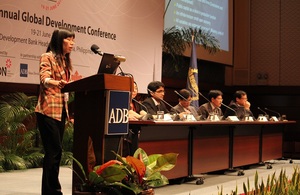DFID Research: Global Development Conference - Improving social protection and government accountability
A recent project by the Global Development Network provides an interesting backdrop of research to its 14th annual conference being held in Manila this week

Participants during the GDN 14th Annual conference. Picture: Global Development Network
The Global Development Network (GDN)’s 14th Annual Global Development Conference– Inequality, Social Protection and Inclusive Growth– is taking place from the 19th to the 21st June in Manila, the Philippines.
The conference expects around 400 participants and will see presentations from this year’s finalists from the GDN Awards and Medals ceremony. The finalists were announced earlier in the week and can be found here.
This year’s conference looks at social policies and social protection systems and how they should be considered in development policy. The conference will host discussions around how social protection can facilitate further poverty reduction and highlight its crucial role in combating social exclusion.
The conference can be followed through a live webcast here.
The conference comes just over a month after the final workshop of a major GDN project. While the current conference looks at cross-cutting themes of inequality and inclusivity, research produced by the recent GDN programme provides an interesting and enriching perspective on specific aspects of improved social protection and government accountability.
The Strengthening Institutions to Improve Public Expenditure Accountability programme was set up in 2008 to help monitor and support capacity building in developing countries. The fundamental goal of this project was to improve development outcomes by increasing the effectiveness with which governments allocate and use their resources.
The project generated research around effective expenditure analysis and improved transparency- looking at 14 different countries it provides an interesting backdrop of research to the plenary talks this week.
Funded by the Department for International Development through the Governance and Transparency Fund, Strengthening Institutions to Improve Public Expenditure Accountability has worked with researchers, over the last 5 years, aiming to build their capabilities around analysing public sector budgets, particularly in allocation of funds to the crucial sectors of water, education and health.
The project had 3 main objectives:
-
To support and strengthen 15 think tanks and research and policy institutions to engage in the analysis and monitoring of the quality of public expenditures, present research findings and policy alternatives for shaping policy debates.
-
To achieve internationally comparable information on public expenditures, incidence (who benefits), effectiveness, and policy reforms in the social sectors and infrastructure (education, health and water)
-
To create a peer-learning network amongst the partners, so that each may take full advantage of the opportunity to learn from the experiences of other countries in monitoring public expenditure
The programme produced a range of research outputs on the various programmes monitored, including a short series of research documentaries.
Many of the research papers deal with issues pertinent to the inclusive growth strategies being discussed at the current GDN conference, highlighting the significance of transparency in successful in-country development.
The conference provides a perfect platform to further develop and discuss the role of expenditure analysis within a broader development context. Bringing together a panel of experts in governance and economics, including individuals from the African Development Bank and the Asian Development bank, the GDN conference will look at those countries suffering from ‘structural economic vulnerability’ and discuss the importance of social protection in these contexts.
With policy simulations generated by the Strengthening Institutions to Improve Public Expenditure Accountability project highlighting the importance of expenditure analysis in assessing the value of social protection in a national context- GDN has gathered together an interesting and significant range of material which complements the ongoing discussions at this week’s conference.